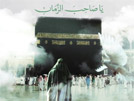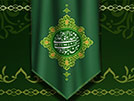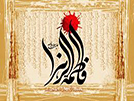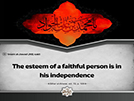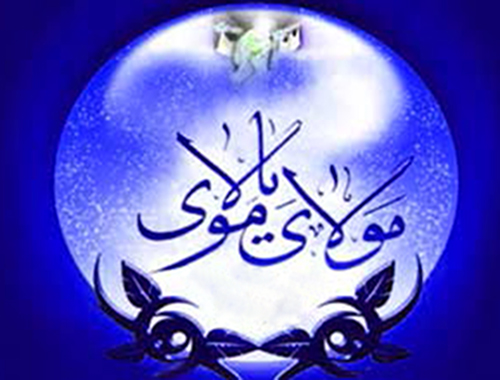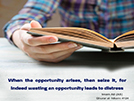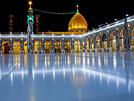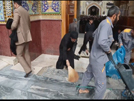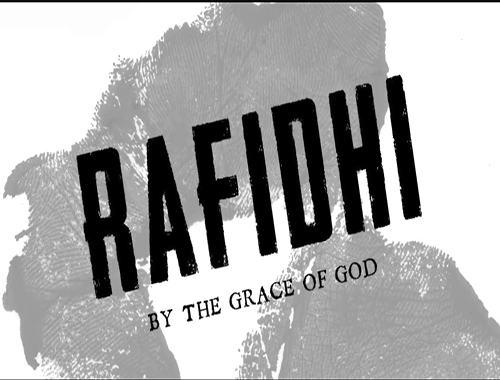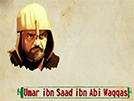Chapter Two
- Details
- Hits: 5193
Chapter Two
ON THE ADHAN
22. Through his chain of authorities, he said: [The Commander of the faithful, peace be on him, said:] "When Allah's Messenger, may Allah bless him and his family, began learning the adha`n (call to prayer), Gabriel brought him the Buraq, but it was difficult for him (to ride it).
Then he brought him a riding animal called Bura`qa and it was difficult for him (to ride it), so Gabriel said to it: 'Be calm, for none more honorable than him in Allah's view has ever ridden you!' It became calm, and Allah's Messenger, may Allah bless him and his family, said: 'I rode it until I reached the veil which was before the Merciful (Allah), and then an angel came out from behind the veil and said:
'Allahu akbar! Allahu akbar! (Allah is greater.)' He (Allah's Messenger) said: 'So I asked: O Gabriel, who is that angel?' He replied: 'By Allah who has honored you with the Prophethood, I have never seen that angel before this hour of mine.' He said: 'Allahu akbar! Allahu akbar! (Allah is greater.)' So he was called out from behind the veil: 'My servant is truthful; I am greater; I am greater!' Allah's Messenger, may Allah bless him and his family, said: 'The angel said: 'Ashhadu anna La ilaha illa' llah, Ashhadu anna La ilaha illa' llah (I bear witness that there is no god but Allah.)'
So he was called out from behind the veil: 'My servant is truthful. I am Allah; there is no god but I.' Allah's Messenger, may Allah bless him and his family, said (that), so the angel said: 'Ashhadu anna Mohammedar rasul 'allah, Ashhadu anna Mohammedar rasul 'allah (I bear witness that Mohammed is the Messenger of Allah.)' So he was called out from behind the veil: 'My servant is truthful; I have sent Mohammed as a Messenger.'
Allah's Messenger, may Allah bless him and his family, said: 'The angel said: 'Hayya 'alla's-salah, Hayya 'alla's-salah (Make haste to the prayer.)' So he was called out from behind the veil: 'My servant is truthful and summons (men) to worship Me.' Allah's Messenger, may Allah bless him and his family, said:
'The angel said: 'Hayya 'alla'l falah, hayya 'alla'l falah (Make haste to salvation).' So he was called out from behind the veil: 'My servant is truthful and summons (men) to worship Me. And surely successful is he who perseveres in it.1 ' Allah's Messenger, may Allah bless him and his family, said: 'Allah has completed for me the honor over the first and the last.'"
The Shï'ites have unanimously agreed that it was the Prophet, may Allah bless him and his family, who legislated the adha`n in this manner which have been mentioned in this tradition or something similar to it; whilst the Sunnis have mentioned that when the Prophet, may Allah bless him and his family, came to Medina, it was difficult for the people to know the timings of his prayers.
So they discussed specifying a certain signal in order to know the timing of the payer of the Prophet, may Allah bless him and his family, lest they should miss the congregational prayers. Hence some suggested a bell, but the Prophet, may Allah bless him and his family, said: "The bell belongs to the Christians." Others suggested a trumpet, but he said: "It belongs to the Jews." Others suggested a tambourine, but he said:
"It belongs to the Romans." Others suggested burning fire, but he said: "It belongs to the Magus." Others suggested setting up a banner, but that did not appeal to him, may Allah bless him and his family. So, he may Allah bless him and his family, stood up concerned; hence 'Abd Allah b. Zayd spent the night concerned because of the concern of Allah's Messenger, may Allah bless him and his family, and he saw in his sleep an angel who taught him the adhan and the iqama (the declaration of standing for prayer), so he told the Prophet, may Allah bless him and his family, about that. The dream coincided with the revelation. So the Prophet, may Allah bless him and his family, ordered it (adhan) to be performed.
This is very impossible, for the adhan and the iqama are of the pre-conditions of prayer; they are like the rest of the pre-conditions such as tahara (purity), istiqba`l al-qibla (facing the qibla), and ibahat al-makan (the place should be permissible). The Revelation came down (to the Prophet) carrying all these pre-conditions and explanations of prayer. Then why did 'Abd Allah b. Zayd see the angle and the rest of Companions (of the Prophet), who were greater than him in importance, did not see him?
'Allahu akbar! Allahu akbar! (Allah is greater.)' He (Allah's Messenger) said: 'So I asked: O Gabriel, who is that angel?' He replied: 'By Allah who has honored you with the Prophethood, I have never seen that angel before this hour of mine.' He said: 'Allahu akbar! Allahu akbar! (Allah is greater.)' So he was called out from behind the veil: 'My servant is truthful; I am greater; I am greater!' Allah's Messenger, may Allah bless him and his family, said: 'The angel said: 'Ashhadu anna La ilaha illa' llah, Ashhadu anna La ilaha illa' llah (I bear witness that there is no god but Allah.)'
So he was called out from behind the veil: 'My servant is truthful. I am Allah; there is no god but I.' Allah's Messenger, may Allah bless him and his family, said (that), so the angel said: 'Ashhadu anna Mohammedar rasul 'allah, Ashhadu anna Mohammedar rasul 'allah (I bear witness that Mohammed is the Messenger of Allah.)' So he was called out from behind the veil: 'My servant is truthful; I have sent Mohammed as a Messenger.'
Allah's Messenger, may Allah bless him and his family, said: 'The angel said: 'Hayya 'alla's-salah, Hayya 'alla's-salah (Make haste to the prayer.)' So he was called out from behind the veil: 'My servant is truthful and summons (men) to worship Me.' Allah's Messenger, may Allah bless him and his family, said:
'The angel said: 'Hayya 'alla'l falah, hayya 'alla'l falah (Make haste to salvation).' So he was called out from behind the veil: 'My servant is truthful and summons (men) to worship Me. And surely successful is he who perseveres in it.1 ' Allah's Messenger, may Allah bless him and his family, said: 'Allah has completed for me the honor over the first and the last.'"
The Shï'ites have unanimously agreed that it was the Prophet, may Allah bless him and his family, who legislated the adha`n in this manner which have been mentioned in this tradition or something similar to it; whilst the Sunnis have mentioned that when the Prophet, may Allah bless him and his family, came to Medina, it was difficult for the people to know the timings of his prayers.
So they discussed specifying a certain signal in order to know the timing of the payer of the Prophet, may Allah bless him and his family, lest they should miss the congregational prayers. Hence some suggested a bell, but the Prophet, may Allah bless him and his family, said: "The bell belongs to the Christians." Others suggested a trumpet, but he said: "It belongs to the Jews." Others suggested a tambourine, but he said:
"It belongs to the Romans." Others suggested burning fire, but he said: "It belongs to the Magus." Others suggested setting up a banner, but that did not appeal to him, may Allah bless him and his family. So, he may Allah bless him and his family, stood up concerned; hence 'Abd Allah b. Zayd spent the night concerned because of the concern of Allah's Messenger, may Allah bless him and his family, and he saw in his sleep an angel who taught him the adhan and the iqama (the declaration of standing for prayer), so he told the Prophet, may Allah bless him and his family, about that. The dream coincided with the revelation. So the Prophet, may Allah bless him and his family, ordered it (adhan) to be performed.
This is very impossible, for the adhan and the iqama are of the pre-conditions of prayer; they are like the rest of the pre-conditions such as tahara (purity), istiqba`l al-qibla (facing the qibla), and ibahat al-makan (the place should be permissible). The Revelation came down (to the Prophet) carrying all these pre-conditions and explanations of prayer. Then why did 'Abd Allah b. Zayd see the angle and the rest of Companions (of the Prophet), who were greater than him in importance, did not see him?

